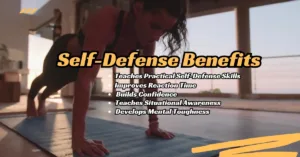
Top Benefits of Kickboxing for Fitness and Self-Defense
- 122
- 0
- 0

Kickboxing for fitness and self-defense is important today because it combines physical exercise with practical skills. It helps improve strength, flexibility, and coordination while boosting confidence. With rising safety concerns, knowing self-defense can empower individuals to protect themselves. Additionally, kickboxing is a fun way to relieve stress and stay active, making it a great choice for anyone looking to enhance their fitness and personal safety. Overall, it promotes a healthier lifestyle and builds essential life skills. Let’s know clearly about the top benefits of kickboxing for fitness and self-defense.
Top Benefits of Kickboxing for Fitness and Self-Defense
Kickboxing is a fun and powerful workout that mixes boxing punches with kicks from martial arts. It’s great for getting fit and learning how to protect yourself. In this blog post, we’ll talk about the top benefits of kickboxing for fitness and self-defense why kickboxing is so good for you, and how it can help you stay safe.
Fitness Benefits

Full-Body Workout
Kickboxing uses almost every part of your body. You’ll work your arms, legs, core, and back all at the same time. This means you get a complete workout in one session. You’ll build strength and muscle all over your body, not just in one or two areas.
Burns Lots of Calories
If you want to lose weight or keep it off, kickboxing is a great choice. It’s a high-energy workout that burns a lot of calories. You can burn up to 800 calories in just one hour of kickboxing! That’s more than many other types of exercise.
Improves Cardiovascular Health
Kickboxing gets your heart pumping fast. This is beneficial for your heart and lungs. Over time, it can help lower your blood pressure and reduce your risk of heart disease. Your body will get better at using oxygen, which means you’ll have more energy for everyday activities.
Boosts Flexibility and Balance
The kicks and punches in kickboxing help you become more flexible. You’ll stretch your muscles as you move, which can help prevent injuries. Kickboxing also improves your balance because you need to stay steady while kicking and punching.
Builds Core Strength
A strong core is important for overall fitness and preventing back pain. Kickboxing works your abs, lower back, and obliques (the muscles on the sides of your stomach). This helps you develop a strong and stable core.
Increases Coordination
Kickboxing involves a lot of different movements. You need to use your hands and feet together, often in quick succession. This enhances your hand-eye coordination and overall body awareness.
Enhances Agility and Speed
The quick movements in kickboxing make you faster and more agile. You’ll learn to change direction quickly and move with more ease. This can help in other sports and everyday life.
Self-Defense Benefits

Teaches Practical Self-Defense Skills
Kickboxing isn’t just about fitness. It teaches you real skills that you can use to protect yourself. You’ll learn how to punch, kick, and block effectively. These skills can be very useful if you ever need to defend yourself.
Improves Reaction Time
In kickboxing, you need to react quickly to your opponent’s moves. This helps improve your overall reaction time. You’ll become better at responding to sudden situations, which is crucial in self-defense.
Builds Confidence
Knowing that you can defend yourself can give you a big boost in confidence. This confidence can help you in many areas of life, not just in physical confrontations. You’ll feel more sure of yourself and your abilities.
Teaches Situational Awareness
Kickboxing training often includes lessons on being aware of your surroundings. You’ll learn to pay attention to what’s happening around you. This can help you avoid dangerous situations in the first place.
Develops Mental Toughness
Kickboxing can be challenging, both physically and mentally. As you push through tough workouts and learn new skills, you’ll develop mental toughness. This can help you stay calm and focused in stressful situations.
Mental and Emotional Benefits
Reduces Stress
Exercise is a great way to reduce stress, and kickboxing is no exception. Punching and kicking can be a great way to let out frustration and tension. After a kickboxing session, you’ll often feel more relaxed and at ease.
Boosts Mood
Kickboxing, like other forms of exercise, can help improve your mood. When you exercise, your body produces chemicals known as endorphins. These are often called “feel-good” chemicals because they can make you feel happier and more positive.
Improves Focus and Concentration
During a kickboxing class, you need to pay close attention to your instructor and focus on your form. This can enhance your overall concentration ability. Many people find that they can focus better at work or school after starting kickboxing.
Builds Self-Discipline
Kickboxing requires regular practice to improve. This helps build self-discipline. You’ll learn to push yourself, set goals, and work hard to achieve them. These skills can be valuable in various aspects of life.
Provides a Sense of Community
Many people enjoy the social aspect of kickboxing classes. You’ll meet new people who share your interest in fitness and self-defense. This can foster new friendships and a feeling of belonging.
How to Get Started with Kickboxing

If you’re interested in trying kickboxing, here are some tips to help you get started:
- Find a Good Gym or Class: Look for a gym that offers kickboxing classes. Make sure the instructors are qualified and the gym has a good reputation.
- Start Slow: If you’re new to exercise or haven’t worked out in a while, start with beginner classes. Don’t push yourself too hard at first.
- Wear Comfortable Clothes: Choose clothes that are easy to move in. You’ll be doing a lot of kicking and punching, so make sure your clothes don’t restrict your movement.
- Stay Hydrated: Stay hydrated by drinking plenty of water before, during, and after your workout. Kickboxing can make you sweat a lot, so it’s important to replace that lost water.
- Listen to Your Body: It’s normal to feel sore after a kickboxing workout, especially when you’re just starting. But if you feel pain, stop and talk to your instructor.
- Be Consistent: Try to go to class regularly. The more you practice, the faster you’ll improve and the more benefits you’ll see.
- Have Fun: Remember that kickboxing should be enjoyable. Don’t worry about being perfect. Focus on having fun and improving a little bit each time.
Safety Tips
While kickboxing is generally safe, it’s important to follow some basic safety rules:
- Warm Up Properly: Always do a good warm-up before you start kicking and punching. This helps prevent injuries.
- Use the Right Equipment: If you’re hitting a punching bag, make sure to wear hand wraps and gloves to protect your hands and wrists.
- Learn Proper Form: Pay close attention to your instructor and focus on using the right form. This will help you prevent injuries and maximize the benefits of your workout.
- Don’t Overdo It: It’s great to push yourself but know your limits. If you’re too tired to use proper form, it’s time to take a break.
- Cool down and stretch: After your workout, make sure to take some time to cool down and stretch. This can help prevent soreness and improve flexibility.
Conclusion
Kickboxing is a great way to get fit, learn self-defense, and improve your mental and emotional well-being. It offers a full-body workout that burns calories, builds strength, and improves cardiovascular health. At the same time, it teaches practical self-defense skills and boosts confidence.
The mental benefits of kickboxing are just as important as the physical ones. It can help reduce stress, improve mood, and build self-discipline. Additionally, it’s an enjoyable way to meet new people and become part of a community.
Whether you’re looking to get in shape, learn how to protect yourself, or just try something new, kickboxing has a lot to offer. So why not give it a try? With the right attitude and a willingness to learn, you might find that kickboxing becomes your new favorite workout.
Remember, everyone starts as a beginner. Don’t be afraid to try something new. With time and practice, you’ll get better and start to see the amazing benefits of kickboxing in your life. So put on your workout clothes, find a local kickboxing class, and get ready to punch and kick your way to better fitness and self-defense skills.
FAQs
Q: Do I need to be fit before starting kickboxing?
A: No, you don’t have to be fit to begin. Kickboxing is for all fitness levels. Classes usually begin with easier moves and get harder as you improve. Just start slow and build up over time.
Q: Is kickboxing safe for women?
A: Yes, kickboxing is safe and great for women. It helps build strength, improves fitness, and teaches self-defense. Many gyms offer women-only classes if you prefer. Always learn from a qualified instructor for safety.
Q: How often should I do kickboxing to see results?
A: For best results, try to do kickboxing 2-3 times a week. You’ll start feeling better after a few weeks. For big changes in fitness and skills, keep at it for at least 3 months.
Q: Do I need special equipment for kickboxing?
A: To start, you just need comfortable workout clothes and water. As you continue, you might want hand wraps, boxing gloves, and a mouthguard. Many gyms provide or rent equipment for beginners.
Q: Can kickboxing help me lose weight?
A: Yes, kickboxing is great for weight loss. It burns lots of calories and builds muscle. Combined with a healthy diet, kickboxing can help you lose weight and get in shape. Remember, consistency is key.
Also Read:
7 Nutrition Tips for Maximizing Workout Results
How Yoga Enhances Both Physical and Mental Well-being
References:
https://pubmed.ncbi.nlm.nih.gov/25332919/
https://pubmed.ncbi.nlm.nih.gov/29157151/
https://en.wikipedia.org/wiki/Kickboxing
Disclaimer: The information provided in this blog on the benefits of kickboxing for fitness and self-defense is for educational purposes only. Please consult a fitness professional or martial arts instructor before starting any new exercise program, especially if you have health concerns.
Related post

7 Health Benefits of Assam Tea


